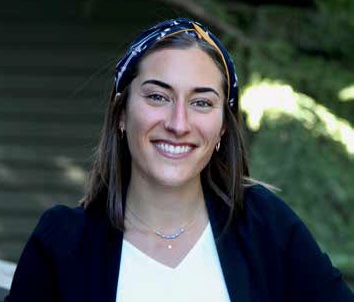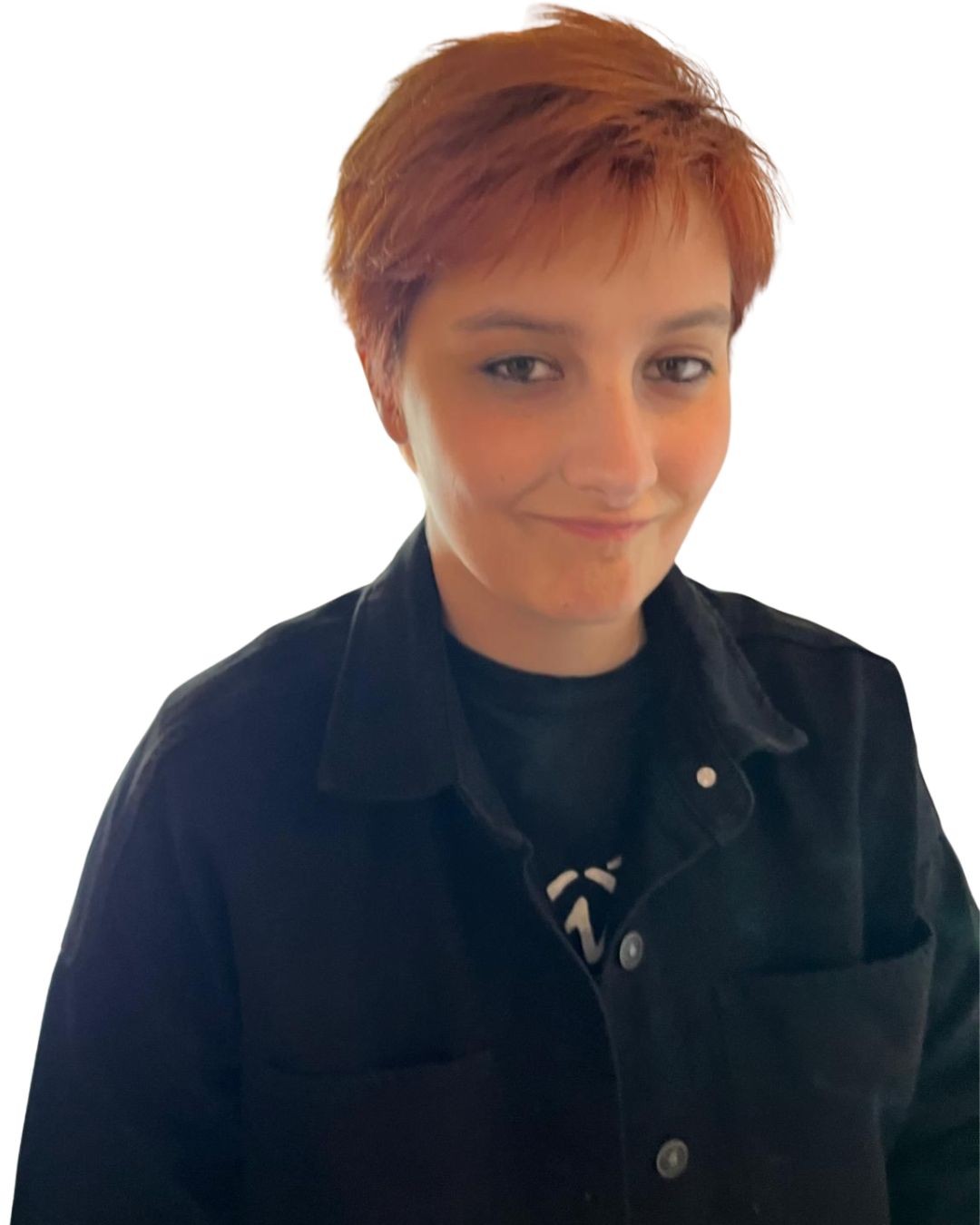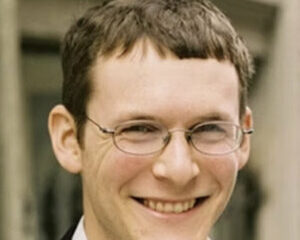Features
Rabbi (to be) Lara Rodin

By GERRY POSNER In May 2025, the Jewish Theological seminary will welcome a new rabbi into the fold. A recent graduate of the seminary, she is a young woman from Western Canada with roots in both Winnipeg and Calgary. Her name is Lara Rodin.
Lara will be the new assistant rabbi at the Beth Tzedec Synagogue in Toronto (not to be confused with the Beth Tzedec Synagogue in Calgary, where her family still lives and where they remain members to this day). Her formal induction into the rabbinate will happen later this year, in May, in New York City.
Rabbi Rodin is a fresh, warm, and engaging young woman who already has made a difference in the lives of many families.
The jump from being Lara Rodin, daughter of Greg and Andria (Paul) Rodin, raised in a secular home, to a woman about to become a rabbi, was hardly preordained. Lara was born in Winnipeg, but she moved with her family at a young age to Calgary where she was a student at the Calgary Jewish Academy. Her connection to Judaism, though, was tenuous. Still, with her growing involvement in BBYO, also at Camps B’nai Brith at Pine Lake, Alberta and Hatikvah in BC, the seeds were already starting to grow and sprout. As well, Lara, had a strong Jewish influence from her maternal grandparents, Leonard and Elaine Paul, of blessed memory, both of whom were strongly centred in the Jewish world, particularly at the Bnay Abraham Synagogue in Winnipeg.
Lara was fortunate to attend McGill University in Montreal, where she obtained an Arts degree. Although her father Greg, a lawyer, had pushed her to study law, she was more interested in courses in philosophy and theology. She soon concluded that she need not focus so much on other religions, but work on the one she was born into.
That decision was the impetus for her to improve her Jewish learning. She even taught a class at the Shaar Hashomayim Synagogue in Montreal. That experience led to her seriously consider a career in teaching.
To proceed on a path to becoming g a teacher and also to further her Jewish education, Lara applied for and was accepted into the Pardes Institute of Jewish Studies in Jerusalem. It was there that not only did she complete her Masters in Jewish Education, Lara came to realize that, while she wanted to teach, she wanted to do it within a Jewish framework. It was the intense learning at Pardes that stimulated Lara’s passion to begin the trail to the rabbinate.
Once you learn more about Lara’s family history, however, you can see how her becoming a rabbi wasn’t all that surprising. When Lara was born, she came along with a twin brother, Isaac. When her father came into the birthing room to see his newborn children for the first time, he said that he sensed that one of the twins was destined to become a rabbi, but it was Isaac, not Lara. Even as the twins grew up, Greg’s sense of a rabbinical calling for his son persisted. When Lara declared her intention to pursue a career in the rabbinate, Greg was ecstatic, stating he had it right all along – he just missed the correct gender. He likely deserves a pass on this one as back at that time, female rabbis from Western Canada were largely unknown and even to this day, a rarity.
Thus, it came to pass that Lara Rodin entered the Jewish Theological Seminary School in New York. She had to cope with the consequences of Covid and so part of her programme had Lara stuck in the basement of her parents’ home in Calgary. In 2021, while still a student, Lara was privileged to become a Tanenbaum Fellow.
Subsequently she developed a more formal association with the Beth Tzedec Synagogue in Toronto, where she has been for the past three years. In 2023- 2024, Lara became a Resnick Fellow. Both the Resnick and Tanenbaum Fellowships were highly valuable to Lara as she proceeded in her Jewish education.
Along the way, even as far back as her attending Camp Ramah, Lara met a boy there who became her husband: Jonah Levitt. They were recently married at Beth Tzedec on August 18, 2024 – another really good reason to send your children to Jewish camps!
Aside from her responsibilities at Beth Tzedec to date, Lara has been working as a Rabbi in Residence at the Robbins Hebrew Academy in Toronto. There she is putting her skills as a teacher to good use. On top of that, she is the go-to person for conversions within the Conservative movement among several synagogues in the Toronto area. In that way Lara Rodin has made contact with many young couples, all inspired to become Jewish and, in many cases, more Jewish. This is a part of her job that she says she finds particularly challenging, yet satisfying.
Of course, if you really want to check out the newest addition to Beth Tzedec, the place to be is at synagogue, where she can be found most of the time. Her smile, her genuine warmth, and her depth of thought will be obvious immediately. Or, if you like to hike or cycle, when not in the synagogue or classroom, you are likely to find Lara participating in those activities.
As the Beth Tzedec synagogue celebrates its 70th anniversary in 2025, so too it now celebrates the addition to the synagogue of Rabbi Lara Rodin. A blessing for all of us.
Features
Are Niche and Unconventional Relationships Monopolizing the Dating World?

The question assumes a battle being waged and lost. It assumes that something fringe has crept into the center and pushed everything else aside. But the dating world has never operated as a single system with uniform rules. People have always sorted themselves according to preference, circumstance, and opportunity. What has changed is the visibility of that sorting and the tools available to execute it.
Online dating generated $10.28 billion globally in 2024. By 2033, projections put that figure at $19.33 billion. A market of that size does not serve one type of person or one type of relationship. It serves demand, and demand has always been fragmented. The apps and platforms we see now simply make that fragmentation visible in ways that provoke commentary.
Relationship Preferences
Niche dating platforms now account for nearly 30 percent of the online dating market, and projections suggest they could hold 42 percent of market share by 2028. This growth reflects how people are sorting themselves into categories that fit their actual lives.

Some want a sugar relationship, others seek partners within specific religious or cultural groups, and still others look for connections based on hobbies or lifestyle choices. The old model of casting a wide net has given way to something more targeted.
A YouGov poll found 55 percent of Americans prefer complete monogamy, while 34 percent describe their ideal relationship as something other than monogamous. About 21 percent of unmarried Americans have tried consensual non-monogamy at some point. These numbers do not suggest a takeover. They suggest a population with varied preferences now has platforms that accommodate those preferences openly rather than forcing everyone into the same structure.
The Numbers Tell a Different Story
Polyamory and consensual non-monogamy receive substantial attention in media coverage and on social platforms. The actual practice rate sits between 4% and 5% of the American population. That figure has remained relatively stable even as public awareness has increased. Being aware of something and participating in it are separate behaviors.
A 2020 YouGov poll reported that 43% of millennials describe their ideal relationship as non-monogamous. Ideals and actions do not always align. People answer surveys about what sounds appealing in theory. They then make decisions based on their specific circumstances, available partners, and emotional capacity. The gap between stated preference and lived reality is substantial.
Where Young People Are Looking
Gen Z accounts for more than 50% of Hinge users. According to a 2025 survey by The Knot, over 50% of engaged couples met through dating apps. These platforms have become primary infrastructure for forming relationships. They are not replacing traditional dating; they are the context in which traditional dating now occurs.
Younger users encounter more relationship styles on these platforms because the platforms allow for it. Someone seeking a conventional monogamous partnership will still find that option readily available. The presence of other options does not eliminate this possibility. It adds to the menu.
Monopoly Implies Exclusion
The framing of the original question suggests that niche relationships might be crowding out mainstream ones. Monopoly means one entity controls a market to the exclusion of competitors. Nothing in the current data supports that characterization.
Mainstream dating apps serve millions of users seeking conventional relationships. These apps have added features to accommodate other preferences, but their core user base remains people looking for monogamous partnerships. The addition of new categories does not subtract from existing ones. Someone filtering for a specific religion or hobby does not prevent another person from using the same platform without those filters.
What Actually Changed
Two things happened. First, apps built segmentation into their business models because segmentation increases user satisfaction. People find what they want faster when they can specify their preferences. Second, social acceptance expanded for certain relationship types that previously operated in private or faced stigma.
Neither of these developments amounts to a monopoly. They amount to market differentiation and cultural acknowledgment. A person seeking a sugar arrangement and a person seeking marriage can both use apps built for their respective purposes. They are not competing for the same resources.
The Perception Problem
Media coverage tends toward novelty. A story about millions of people using apps to find conventional relationships does not generate engagement. A story about unconventional relationship types generates clicks, comments, and shares. This creates a perception gap between how often something is discussed and how often it actually occurs.
The 4% to 5% practicing polyamory receive disproportionate coverage relative to the 55% who prefer complete monogamy. The coverage is not wrong, but it creates an impression of prevalence that exceeds reality.
Where This Leaves Us
Niche relationships are not monopolizing dating. They are becoming more visible and more accommodated by platforms that benefit from serving specific needs. The majority of people seeking relationships still want conventional arrangements, and they still find them through the same channels.
The dating world is larger than it was before. It contains more explicit options. It allows people to state preferences that once required inference or luck. None of this constitutes a takeover. It constitutes an expansion. The space for one type of relationship did not shrink to make room for another. The total space grew.
Features
Matthew Lazar doing his part to help keep Israelis safe in a time of war

By MYRON LOVE It is well known – or at least it should be – that while Israel puts a high value of protecting the lives of its citizens, the Jewish state’s Islamic enemies celebrate death. The single most glaring difference between the opposing sides can be seen in the differing approach to building bomb shelters to protect their populations.
Whereas Hamas and Hezbollah have invested untold billions of dollars over the past 20 years in building underground tunnels to protect their fighters while leaving their “civilian” populations exposed to Israeli bombs, not only has Israel built a highly sophisticated anti-missile system but also the leadership has invested heavily in making sure that most Israelis have access to bomb shelters – wherever they are – in war time.
While Israel’s bomb shelter program is comprehensive, there are still gaps – gaps which Dr. Matthew Lazar is doing his bit to help reduce.
The Winnipeg born-and raised pediatrician -who is most likely best known to readers as a former mohel – is the president of Project Life Initiatives – the Canadian branch of Israel-based Operation Lifeshield whose mission is to provide bomb shelters for threatened Israeli communities.
Lazar actually got in on the ground floor – so to speak. It was a cousin of his, Rabbi Shmuel Bowman, Operation Lifeshield’s executive director, who – in 2006 – founded the organization.
“Shmuel was one of a small group of American olim and Israelis who were visiting the Galilee during the second Lebanon war in 2006 and found themselves under rocket attack – along with thousands of others – with no place to go,” recounts Lazar, who has two daughters living in Israel. “They decided to take action. I was one of the people Shmuel approached to become an Operation Lifeshield volunteer.
Since the founding of Lifeshield, Lazar reports, over 1,000 shelters have been deployed in Israel. The number of new shelter orders since October 7, 2023 is 149.
He further notes that while the largest share of Operation Lifeshield’s funding comes from American donors, there has been good support for the organization across Canada as well.
One of the major donors in Winnipeg is the Christian Zionist organization, Christian Friends of Israel (FOI) Canada which, in September, as part of its second annual “Stand With Israel Support” evening – presented Lazar and Operation Lifeshield with a cheque for $30,000 toward construction of a bomb shelter for the Yasmin kindergarten in the Binyamina Regional Council in Northern Israel.
Lazar reports that to date the total number of shelters donated by Friends of Israel Gospel Ministry (globally) is over 100.
Lazar notes that the head office for Project Life Initiatives is – not surprisingly – in Toronto. “We communicate by telephone, text and Zoom,” he says.
He observes that – as he is still a full time pediatrician – he isn’t able to visit Israel nearly as often as he would like to. He manages to go every couple of years and always makes a point of visiting some of Operation Lifeshield’s projects.
(He adds that his wife, Nola, gets to Israel two or three times a year – not only to visit family, but also in her role as president of Mercaz Canada – the Canadian Conservative movement’s Zionist arm.)
“This is something I have been able to do to help safeguard Israelis,” Lazar says of his work for Operation Lifeshield. “This is a wonderful thing we are doing. I am glad to be of help. ”
Features
Patterns of Erasure: Genocide in Nazi Europe and Canada

By LIRON FYNE When we think of the word genocide, our minds often jump to the Holocaust, the mass-scale, systemic government-led murder of six million Jews by Nazi Germany during the Second World War, whose unprecedented scale and methods led to the very term ‘genocide’ being coined. On January 27th, 2026, we will bow our heads for International Holocaust Remembrance Day, the 80th year of remembrance.
Less frequently do we connect genocidal intent to the campaign against Indigenous peoples in Canada; the forced displacement, cultural destruction, and systematic killing that sought to erase Indigenous peoples. The genocide conducted by the Nazis and the genocidal intent of the Canadian government, though each unique in scale, motive, and implementation, share many conceptual similarities. Both were driven by ideologies of racial superiority, executed through governmental precision, and justified by the perpetrators as a moral mission.
At their core rests the concept of dehumanization. In Nazi Germany, Jews were viewed as subhuman, contaminated, and a threat to the ‘Aryan’ race. In Canada, Indigenous peoples were represented as obstacles to ‘progress’ and seen as hurdles to a Christian, Eurocentric nation. These ideas, this dehumanization, turned human beings into problems to be solved. Adolf Hitler called it the ‘Jewish question,’ leading to an official policy in 1942 called the ‘Final Solution to the Jewish Question,’ whereas Canadian officials called it the ‘Indian problem.’ The language is similar, a belief that one group’s existence endangers the destiny of another. The methods of extermination differed in practice and outcome, but the language of intent resembles one another.
The Holocaust’s concentration camps and carefully engineered gas chambers were designed for efficient, industrial-scale killing, resulting in mass murder. The well-organized plan of systematic degradation, deadly riots, brutal camp conditions, and designated killing centres were only a few of the ways the Nazis worked to eliminate the Jews. The Canadian government’s weapons were policy, assimilation and abandonment. Such as the Indian Act, reserves, and residential schools, which were all meant to ‘kill the Indian in the child,’ cutting generations off from their languages, families, and cultures. Thousands of Indigenous children died in residential schools, buried in unmarked graves near schools that called themselves places of learning. Both systems were backed by either religion or ideology; Nazi ideology brought together racist eugenic policies and virulent antisemitism, while Canada’s genocidal intent was supported by Christian Protestantism claiming to save Indigenous souls by erasing their heritage.
The Holocaust was a six-year campaign of complete industrialized extermination, mass murder with a mechanized intent, on a scale that remains historically unique. The Truth and Reconciliation Commission describes Canada’s indigenous genocide as a cultural one that unfolded over centuries through assimilation and the destruction of indigenous languages and identities. The Holocaust ended with the liberation of the camps and a global recognition of the atrocities committed. However, the generational trauma and dehumanization of antisemitism carry on. For Indigenous peoples in Canada, the effects of the genocidal intent continue to this day, visible in displacement, poverty, and intergenerational trauma. While these histories differ in form and timeline, both are rooted in dehumanization and the belief that some lives are worth less than others.
A disturbing similarity lies in the aftermath: silence and denial. The Holocaust forced the world to confront the atrocity with the vow of ‘Never Again,’ which has now been unearthed and reformed as ‘Never Again is Now,’ after the October 7th, 2023, massacre by Hamas. The largest massacre of Jewish people since the Holocaust, and the denial of the atrocities committed on October 7th, highlight the same Holocaust denial we see rising around the world. In Canada, for decades, the genocidal intent was hidden behind narratives of kindness and social progress. Only in recent years, through survivor testimony for the Truth and Reconciliation Commission, and the discovery of unmarked graves, has the truth gained recognition. But acknowledgment without justice risks repeating the same patterns of erasure.
Comparing these atrocities committed is not about comparing pain or scale; it is about understanding the shared systems that enabled them. Both demonstrate how racism, superiority, and dehumanization can be used to justify the destruction of human beings. Remembering is not enough in Canada. True remembrance demands accountability, land restitution, reparations, and education that confronts Canada’s ongoing colonial legacy. When we say ‘Never Again is Now’, we hold collective action to combat antisemitism in all forms. The same applies to Truth & Reconciliation; it must be more than a slogan; we must apply action to Truth & ReconciliACTION.
Liron Fyne is a 12th-grade student at Gray Academy of Jewish Education in Winnipeg. They are currently a Kenneth Leventhal High School Intern at StandWithUs Canada, a non-profit education organization that combats antisemitism.




